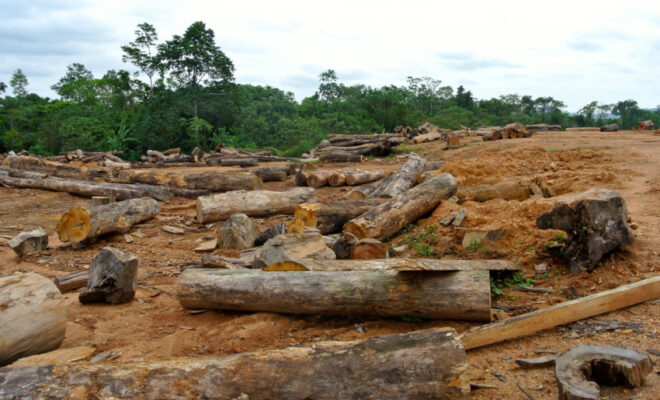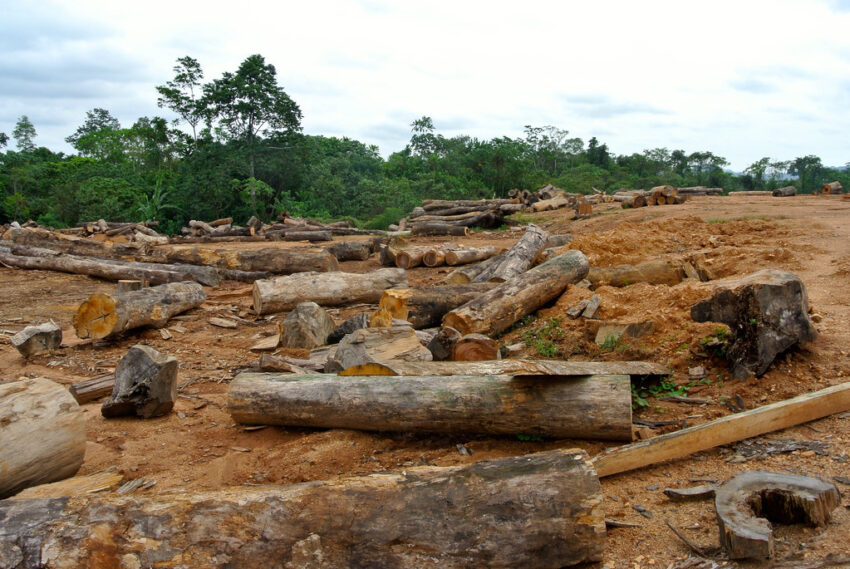“People want to be rich overnight”: Nigeria logging abounds despite ban

In Cross River state, home to much of Nigeria’s remaining forest, locals and officials accuse the state government of profiting from illegal logging.

Cross River state in Nigeria is estimated to have lost nearly 9% of its tree cover since 2000 due to deforestation. Credit: Mathias Rittgerott/Rettet den Regenwald.
As a child in the 1970s, Godwin Esira frequently ventured into the forest in Ekuri to collect local foods like bush mango and afang (commonly referred to as “salad”). He would sell the ingredients to buyers mostly from Calabar, the capital of Cross River state in south-south Nigeria. Like many in the area, the young Esira relied on the proceeds to help him through primary and secondary education.
“The forest was our main source of income,” he recalls, now 58. “Almost everyone that lived in the community depended on the forest to send their children to school.”
Just 50 years later, however, this rich source of livelihood is a distant memory. “Today, it is difficult to get salad and this is affecting the economy of the community,” says Esira. “Many can’t sponsor their children to school.”
The reason for this change is mass deforestation. According to Global Forest Watch, Nigeria lost 1.14 million hectares of its biodiverse forest in just 20 years, from 2001 to 2021. That accounts for about 11% of the country’s total tree cover and an area bigger than The Gambia. Cross River State, which contains much of the country’s remaining rainforest, has lost nearly 9% of its tree cover since 2000.
Amid this destruction, the community in Ekuri have mobilised. They have arranged a campaign that declares: “These forests are globally recognized as one of the most biodiverse and best kept rainforests in Africa, thanks to the Ekuri people who have lived in, managed and protected these forests for many centuries. Long before colonial and postcolonial governments existed, the Ekuri people had developed spirituality, culture and livelihoods that are intimately interwoven with these forests.”
Their efforts have had some success. In 2015, for instance, the community protested against the state government’s plans to build a six-lane superhighway through the rainforest. Local activists called upon support within and beyond Nigeria, eventually delivering a petition with over 250,000 signatures to the federal government. In 2017, state officials agreed to re-route the planned road away from protected areas.
The Ekuri community has struggled much more, however, to curb large-scale forest clearings conducted to make way for plantations of cocoa, palm oil, and other crops. With consent from the state, agribusinesses have cut down hundreds of hectares of forest in recent years to repurpose the land for commercial monocropping.
These corporations also often benefit from so-called “salvage logging” through which they are allowed to sell the cleared trees to the public. The profits from this alone sometimes supplant the primary focus of the business. In the mid-2010s, for instance, Dansa Allied Agro was awarded a licence to set up a pineapple plantation yet became one of Cross River’s biggest sellers of timber for several years, cutting down huge swathes of forest and establishing extensive timber processing facilities.
The Ekuri community has found it similarly difficult to combat illegal logging. In 2008, the state government outlawed these forest activities in a bid to slow deforestation. The ban, however, drove up the price of timber and led to the emergence of a lucrative black market. According to Edwin Ogar, an Ekuri chief and former head of the Ekuri initiative, one felled tree today can be worth around N10 million (about $22,000). Logging has continued with, more recently, Chinese nationals joining in, exporting highly-valued species of wood such as Apa and Bubinga to Asia.
“It is now a political affair”
Despite the ban on logging, some members of the Ekuri community believe the illicit activity is nonetheless conducted with the consent of the state government.
“The reason for illegal logging is the issue of corruption by those in governments; people want to be rich overnight,” says Ogar. “Our situation is so pathetic. If the chief executive officer of the state should say I want this to stop, it will stop. The government is not concerned at all.”
Raphael Offiong, director of the University of Calabar Carbon Innovation Center, concurs. “The forest is almost gone,” he says. “The government itself is complicit [and] the forestry commission is an accomplice.”
Even Odey Oyama, the former chair of the Cross River state Anti-Deforestation Taskforce (ATF), the body set up to enforce the logging ban, believes that officials are involved in the illicit activity. He left the ATF in March 2020 after just four months in the role. His resignation followed an incident in which the taskforce impounded three trailer loads of timber products understanding them to have been unlawfully acquired. Oyama requested the police maintain custody of the goods pending further directives, but just days later, Tony Undiandeye, Chair of the Cross River State Forestry Commission, asked the police to release the trucks. Undiandeye says he was following the formal processes, but Oyama disagrees.
“Government complicity and the negligence of the forestry commission are major reasons why illegal logging thrives in Cross River State,” says the former ATF chair. “The institution of the government that is legitimately responsible for the protection of the resources is doing nothing about it. You will see hundred trailer loads of timber leave the state every day.”
Frank Eja, director of Cross River State Forestry Commission, says he does not know about the allegations against Undiandeye, his boss, but agrees that logging has intensified. He estimates that, every day, over 120 trailers carrying timber leave the state by road alone to neighbouring AkwaIbom, Benue, and Ebonyi states. Each trailer, he says, must pay N500, 000 (about $1,100) as a fee and alleges that this money ends up being shared among top officials in state government.
These same elites, according to Eja, have repeatedly frustrated the commission’s efforts to protect the forests. He recalls how, last August, the forestry commission inaugurated a 16-member committee to lead the fight against illegal logging. The next morning, he says, the state press secretary released a statement announcing the committee had been disbanded.
Eja says the forestry commission is “helpless and handicapped” in the face of this resistance. “There is nothing we can do,” he says. “We do not have any support from the state government. We have made so many moves to have this [forest] controlled but it doesn’t work. It is now a political affair.” The Cross River state government did not respond to requests for comment from African Arguments.
Like Oyama and members of the Ekuri community, Eja believes that illegal logging will only be tackled when state authorities want to stop it. “Once that is done, the nonsense will stop,” he says.
Until then, locals like Esira continue to watch their beloved forest diminish with devastating consequences not just for their livelihoods but for the whole globe. Deforestation releases billions of metric tonnes of CO2 into the atmosphere every year and is responsible for up to 15% of all carbon emissions related to human activity. It has been estimated that, today, just 10% of Nigeria’s original forests, rich in biodiversity, are still standing.
“My fear is that in no time, our forest will go extinct and global warming will increase,” says Esira. “We just hope the next government will allow us to conserve our forest.”






On Grand Corruption in Nigeria: see Petrus C. van Duyne and Jackie Harvey, Grand Corruption in Nigeria. Nigeria’s grabbing elite. In: Narrating organised crime stories and Aristotelian principles of drama. Published by Eleven, P.O.Bus, 85576. 2508CG The Hague, Netherlands.
http://www.elevenbub.com